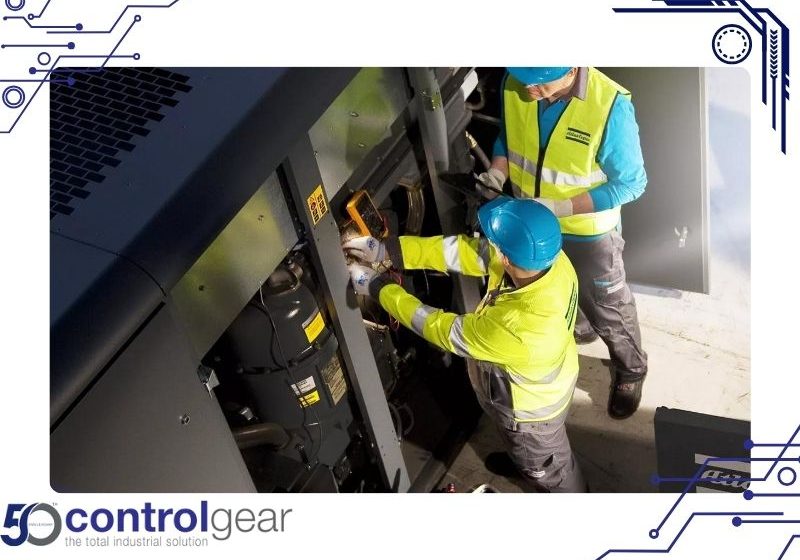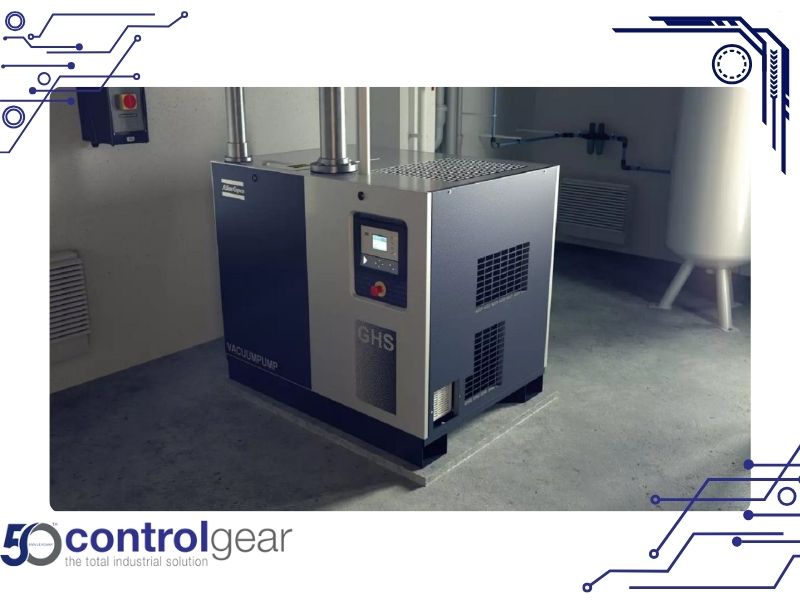
How to Make Your Air Compressor More Efficient
If your industry makes use of an air compressor system, then you will know that each air compressor can take up a significant amount of your energy costs, up to 40%, in some of the busiest businesses.
Facing these increased energy costs can be difficult, especially when you need to reduce outgoings rather than increase them. To help, we’ve shared some simple tips that you can use to ensure air compressor efficiency, reduce waste and achieve better emissions results – take a look at them now!
Table of Contents
Make Sure You Have the Right Size Compressed Air System
It may sound obvious, but considering the type of air compressor you have in place is an important step, as the wrong size air compressor can cost more than you realise. To do this you will need to think about how much air flow you need, what operating pressure you require, how many air compressors you have in place, and how many hours per month/year your company operates. If you aren’t sure, Control Gear will be happy to do the calculations for you.
When you have a clear idea of the size of air compression system you need, you can decide if yours is helping or hindering you. An old or inefficient compressor can cost significantly more energy than a new version. Plus, you should also consider whether you need a fixed speed compressor or variable speed compressors to match the demand in your industrial compressed air system.
Eliminate Air Leaks Leakages
Even if you have the right system in place, air leaks can have a detrimental impact on your air compressor efficiency. Fixing air leaks is vital in these situations as older compressed air systems can cost up to £1000 extra to run each week when there are leaks in the system.
Wondering how to check for air compressor leaks? One of the best ways is to run your air compressor system at zero production to allow you to see where leaks may be occurring. The good news is that taking the time to check your air compressors can mean instant and significant energy savings. You can also use an ultrasonic acoustic leak detector if you need to pinpoint the exact positions of your leaks.
Reduce Your Unloaded Running
No matter how much your air compressors are used, you are sure to see fluctuations in your air demand, which can offer better energy consumption and reduce energy waste. Start by looking for patterns in usage and note down when they happen.
With this information, you can then use compressor controllers to reduce unloaded run times. Not sure why this is a good idea? Unloaded running can use up to 25% of the energy used when running at full load – leading to increased costs.
Organise a Regular Maintenance Schedule
When you consider the impact of air leaks, it brings up the need for better maintenance all year round, helping you to avoid common issues such as the air compressor’s efficiency, the air compressor performance, the air intake quality and wasted energy.
To maintain your compressed air system, you will need to arrange regular checks and repairs as well as think about the need to replace parts to improve the functioning of the system as well as optimising energy efficiency. You can choose to use your own maintenance teams to provide this support or find a maintenance supplier – such as Control Gear – that specialises in air compression systems and system efficiency.
Consider Replacing Older Compressed Air Systems
No matter how well you look after your air compressors, there will come a time when it is more financially viable to invest in modern, efficient air compressors. Compressed air units are designed to last around 7 – 10 years, providing you with energy efficient air compressor solutions. However, the air compressor’s efficiency will decline year on year and by the time the 7 – 10 years have ended, you could have higher energy costs than ever before.
If you are looking to replace your compressed air units, take the time to think about the best new system for you. You should also shop around for the best deal, with many areas offering exchange programmes that you can access. If the price is too high to invest in compressor installation then you can look to replace key components instead that will have a positive effect on your energy consumption.
Reduce the Pressure
If you want a quick and easy way to reduce the total compressed air consumption of your system, then reducing the system pressure is a simple starting point that will save energy. In short, reducing your air supply pressure by 1 bar can help to provide a 7% reduction in total energy costs. This type of pressure drop is clearly a great way to make instant savings.
Interestingly, by lowering your compressor pressure bands, you won’t just lower operating costs but you will also reduce the risk of leaks occurring and costing more energy than you can afford. This means that pressure drops, when kept above the minimum pressure, can really help you save energy and money!
Think About Heat Recovery Systems
There’s no doubt that compressed air production produces a significant amount of waste heat. By thinking about a waste heat recovery system, you can convert that energy usage into energy efficient savings rather than allowing the system to take the heat and turn it back into cool air without being useful to you first
Many compressed air users can recover up to 94% and then use that for space heating, hot air and hot water, helping to reduce costs and increase energy savings with very little effort.
Think About the Type of Technology You Need
Even if you take the time to organise a pressure drop or invest in heat recovery to get the most from your electrical energy, you should also stop to consider the type of technology you need to get the best output. For many industries, oil-free compressors are important as they help to keep your products untainted and in good order. Oil-free solutions also help you reduce the need for treatments and filter changes.
The other great thing about opting for oil-free variable or fixed speed compressors is that you can look forward to less energy loss and less need for specialised lubricants, especially for food industry needs.
Work Out Whether a VSD is Better Than a Fixed Speed Unit
Picking the best type of compressor for your needs will also help you to achieve an efficient solution. Fixed speed compressors are best for industries that need constant and high levels of air compression. However, they can also create pressure drops and spikes that stop your system from being as efficient as possible.
Variable speed compressor efficiency is higher as the intake air and output are created to meet your needs. They are particularly effective for industries that need different levels of compressed air over time.
Invest in a Compressed Air Audit
Our final tip to help you make your compressor more energy efficient is to invest in a compressed air audit. By accessing a professional auditing service, you will be able to get an accurate take on your current compressed air consumption.
With a clear idea of consumption, you can then take the information you’ve been given and use it to help you increase efficiency, look for issues and know when the best time is to replace your system,

Let Control Gear Help
When it comes to making decisions about air compressor energy efficiency, it is important to know where to turn. Whether you have questions about:
· Air Quality
· Motor Power Rating
· Oil Injected Screw Compressors
· Multiple Compressors
· Pressure Drops
· Or More!
Control Gear is here to provide you with the answers you need and the support you require to make compressed air energy savings a reality!
Simply reach out to our team and let us help you get the information you need to create a compressed air network that works hard for you!
